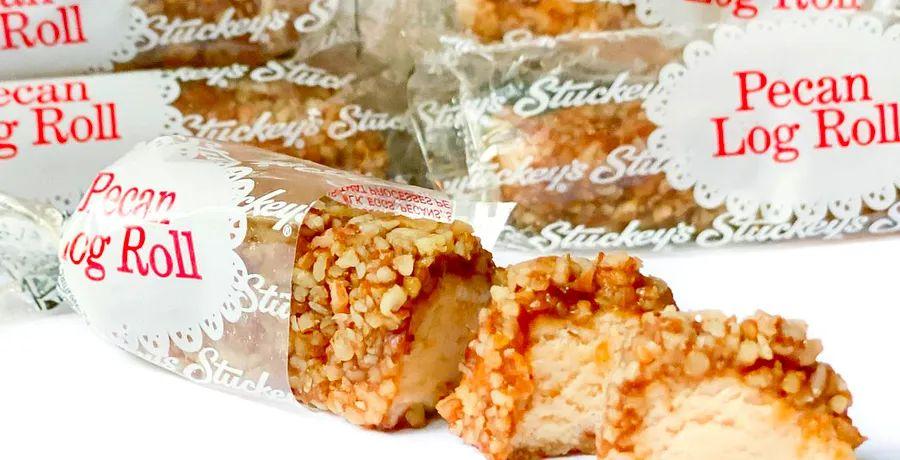The Unassuming Pecan Fuels the Comeback of the Beloved Southern Road Trip Brand Stuckey’s

Stephanie Stuckey took on the role of CEO of Stuckey’s, the iconic Southern road trip chain, in 2019. Founded by her grandfather, W.S. 'Sylvester' Stuckey Sr., in 1937 as a roadside pecan stand in Eastman, Georgia, she now represents the third generation to guide the company. Frequently traveling from presentations in Houston to the Sweets and Snacks Expo in Chicago, she shares her journey for the brand across social media.
Unlike her grandfather and father, who prioritized maintaining appealing interstate stores and restaurants, Stephanie Stuckey is adopting a fresh strategy to attract business and engage new customers. The former Georgia state representative and attorney acquired a new candy factory in 2021, partnered with a new company president, and is revitalizing the 85-year-old Southern travel brand with a focus on one essential element: the pecan.
 Stuckey’s Corporation
Stuckey’s CorporationStuckey doesn’t have many memories of her grandfather, but one moment has lingered over the years, much like molten caramel in pecan brittle before it hardens. She recalls walking through the original candy plant in Eastman with him when she was just 8 years old. As she observed the creation of Stuckey’s renowned pecan brittle, she saw the warm mixture meet a chilling marble table, solidifying instantly. It spread out and began to crack due to the temperature shift, while plant workers smashed it into bite-sized pieces with hammers. Stuckey remembers snatching one from the table as she walked by.
'I just remember it being incredibly delicious,' she shares. 'That memory stays with me to this day.'
When Stuckey stepped into the role of CEO in 2019—the sole family member interested in rejoining the business—she focused on the iconic Georgia nut, increasing production of the company’s beloved pecan log roll, a nougat confection filled with maraschino cherries, coated in caramel, and rolled in chopped Georgia pecans.
'The essence of everything we've created is the pecan, the only snack nut indigenous to this country,' Stuckey notes about the company’s heritage.
Stuckey recently visited the closed plant in Eastman, which still contains the old brittle-making machinery. 'I wish I could have restored that plant,' she reflects, 'but it’s in really poor condition.'
 W.S. “Sylvester” Stuckey, Sr.
W.S. “Sylvester” Stuckey, Sr.Before launching his first store, Sylvester sourced pecans from local farmers and neighbors with pecan trees, selling the nuts at his roadside stand in Eastman. His wife, Ethel, used some of these pecans to create pralines, divinity (nougat candy covered in pecans), and the iconic pecan log rolls, which have become the company’s signature treat.
Customers would stop by to buy bags of pecans and candies for their journeys. Stuckey recalls that her grandparents quickly recognized the demand for their products and other roadside services. They expanded their offerings to include gas, souvenirs, and restrooms, opening the first standalone Stuckey’s store in Eastman about a year after starting their roadside venture. As the business flourished, her grandfather eventually purchased the candy plant in Eastman.
With their vibrant teal roofs, Stuckey’s became a favorite stop for road trippers. At its height in the 1960s, the company boasted over 350 locations across 40 states, accompanied by thousands of highway billboards inviting travelers to “Relax, Refresh, & Refuel.”
Each Stuckey’s store had its own unique character: a Florida location might feature quirky alligator heads and shell wind chimes, while a Virginia store could offer souvenirs celebrating U.S. history.
Tim Hollis, 59, has fond memories of visiting Stuckey’s during family road trips.
'I came from a family that valued preservation,' recalls the Birmingham, Alabama native. 'My dad was meticulous about keeping everything during our vacation travels—every brochure, postcard, and roadmap. Ironically, he stored those treasures in empty Stuckey’s candy boxes.'
 A 1970s advertisement for Stuckey’s.
Stuckey’s Corporation
A 1970s advertisement for Stuckey’s.
Stuckey’s CorporationAs an author of multiple books on the history of Southern tourism, Hollis has even penned a work specifically about the roadside chain, highlighting Stuckey’s as one of the most emblematic businesses to emerge from the road trip era in the Southeast.
'Although they had locations in nearly every state, when people think of Stuckey’s, they immediately associate it with trips to Florida and Georgia,' he notes. 'That’s truly where it originated, and it will forever be tied to those Southern family vacations.'
However, as the times changed, so did the company. In 1964, Sylvester Stuckey merged the business with Pet Milk, Inc., and over the next two decades, it changed hands several times, leading to a gradual decline. It wasn’t until 1984 that Stephanie Stuckey’s father, W.S. “Billy” Stuckey Jr., a five-term congressman from Georgia, repurchased the company.
He revitalized it using profits from his other ventures, particularly Dairy Queen. Holding franchise rights to the fast-food chain along interstates in the continental U.S., he began incorporating Stuckey’s into some Dairy Queen locations, giving rise to the Stuckey’s Express format we still see today. This store-within-a-store approach created licensed Stuckey’s shops featuring a section for the brand’s products, though they aren’t standalone Stuckey’s. Currently, only about 15 original roadside shops from Stuckey’s grandfather’s era remain, primarily found throughout the South.
After Stuckey’s father retired and handed the business over to a small group of partners, it wasn’t sufficient to maintain stability. With the Eastman candy plant sold, the core support system that once sustained the company was lost, Stuckey explains.
'All we had was a rented warehouse filled with some inventory and 68 locations that we no longer own or operate,' Stuckey reflects on the licensed stores. 'That wasn't generating enough revenue to sustain our operations.'
She concluded that the reliance on Stuckey’s stores—whether licensed or standalone—had to end. Instead, she redirected the company’s focus toward food sales while also tapping into the brand’s nostalgic roots. Within six months, she was profitable. From 2019 to 2021, sales of candy and nuts surged by about 35 percent, and Stuckey estimates that figure approached 50 percent in 2022.
Though she lacks a formal business background, Stuckey attributes her experiences as a state representative and public defender to developing her skills as a strong advocate for meaningful causes and tackling difficult questions—abilities she employs when pitching to investors, seeking financing, and closing sales.
Her knack for negotiating with investors while tapping into the brand’s nostalgia has been crucial for the revitalization of Stuckey’s and its pecan products over the past three years, according to company president R.G. Lamar. Stuckey promotes pecans, brittle, and log rolls on Instagram and Twitter, and even offers a platform for customers to share their cherished Stuckey’s memories via an online guest book.
Lamar, Stuckey’s business partner, is also a third-generation farmer at Lamar Pecan Company in Hawkinsville, Georgia, which has overseen the Stuckey’s pecan orchard for 20 years. He joined Stuckey’s after the company acquired his own pecan snack business, Front Porch Pecans.
 Stuckey’s CEO Stephanie Stuckey with company president R.G. Lamar.
Eric Ellis
Stuckey’s CEO Stephanie Stuckey with company president R.G. Lamar.
Eric Ellis'We shared a similar vision for promoting pecans as a snack, so we decided to join forces,' he explains.
In 2021, he and Stuckey acquired a new candy plant and pecan-shelling facility in Wrens, Georgia. What was once a six-figure debt has now transformed into over $2 million in revenue for the company.
'It’s because [Stuckey’s is] a fantastic brand,' she states. 'We have a distinctive product, and we’re concentrating on what’s successful — and that’s the food.'
This involves sourcing pecans from Georgia farmers to create both sweet and savory snacks that cater to those seeking less-processed options while traveling. The plan includes selling various pecan products like raw nuts, nut pieces, and pecan meal. Her ambition is to establish Stuckey’s as the premier brand for pecans—similar to how Planters is recognized for peanuts or Blue Diamond for almonds—by placing Stuckey’s pecans in grocery stores, convenience outlets, and popular roadside restaurants and country stores such as Cracker Barrel.
In the future, she envisions owning several Stuckey’s interstate stores to revive the original concept of the company as a “roadside oasis,” while simultaneously expanding the pecan side of the business to ensure its longevity for another 85 years.
While nostalgia makes longtime fan Hollis wish for the reopening of all the old stores, he recognizes the necessity for the business to evolve to remain viable. Hollis has seen many childhood brands disappear, so he’s pleased that Stuckey’s is still available for a new generation to discover during road trips across Georgia and the South.
'It would’ve been a shame if the same fate had befallen Stuckey’s, leaving no locations for today’s travelers to visit,' Hollis remarks. 'We would have lost a piece of history.'
Kris Martins is a Brazilian-American journalist examining the intersection of the restaurant industry and food culture. Her work has been featured in Dinogo Atlanta, the Atlanta Journal-Constitution, Atlanta magazine, and MyRecipes. Outside of writing, she enjoys visiting farmers markets, sharing a delightful bottle of wine, or experimenting with new recipes at home.

1

2

3

4

5
Evaluation :
5/5